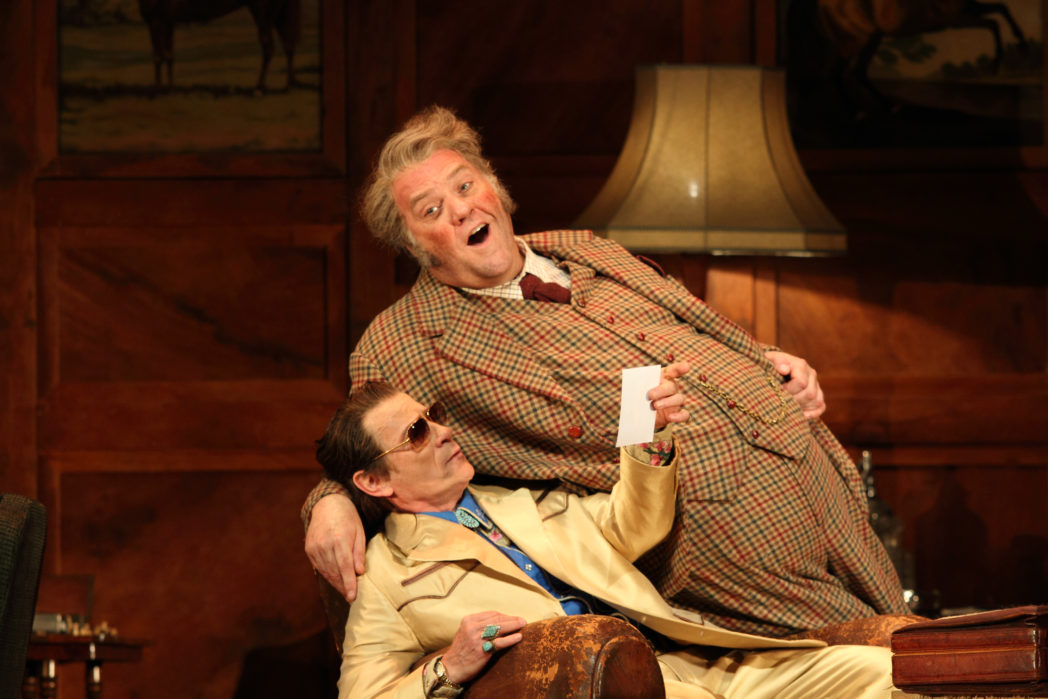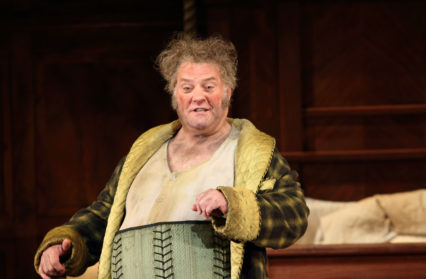David Truslove visits Covent Garden’s Royal Opera House for Bryn Terfel’s larger than life performance of Falstaff.
If the Gods have pre-ordained certain singers for specific roles on the operatic stage, then Sir Bryn Terfel, padded here like a pin-cushion, seems to have been born for Verdi’s comic masterpiece. Who better than he to reinvent Shakespeare’s loveable, yet lecherous rogue, whose attempts to seduce two rich married women to improve his finances go comically wrong with his come-uppance? The Welshman has Falstaff in his blood, as performances with Welsh National Opera a decade ago and, earlier still, at Covent Garden testify. (And let’s not forget his exceptional recording for Deutsche Grammophon with Claudio Abbado.) On this showing at the Royal Opera House – a revival of Robert Carsen’s 2012 presentation – the larger than life Terfel (now fifty-two) still commands the stage with bags of personality and undiminished vocal authority.

Carsen’s gleaming production, revived by Daniel Dooner, propels a 1590s Garter Inn into a plush country house hotel of the 1950s, bedecked with oak panelling, white-gloved waiters and retired colonels all handsomely kitted out by Brigitte Reiffenstuel’s stylish costumes. No post-war austerity here, and the sense of class division is palpable in its nouveau riche ‘Merry Wives’ and the faded aristocratic figure of Sir John Falstaff sporting plus fours and fox hunting regalia. But he’s decidedly past his prime in the opening scene where he wears a grubby onesie and occupies a bed the size of Belgium. From here he attempts to settle a bill he can no longer pay.
Some protracted scene changes on the first night impeded the dramatic flow, yet Paul Steinberg’s glamorous sets are worth waiting for, especially the Palm Court room with its chandeliers and cake trolleys, and Alice Ford’s eye-popping kitchen, all mod cons straight out of the latest designer catalogue. But the sight of a stabled live horse chomping hay, and nearly upstaging Terfel, doesn’t quite mask a rather unimaginative Herne’s Oak in Act Three for which recycled oak panels don’t add much to a starlit Windsor Forest and sadly fail to engender any magic.
Not to worry, there’s plenty of enchantment from this seasoned cast whose energy and wit keep things bubbling along. While the anarchic linen basket scene progresses in the manner of a panto (where the orchestra’s string section have fun with its Tom and Jerry style writing), there are some finely judged episodes earlier, such as a frozen tableau of hotel guests (glasses and forks poised in mid-air) forming a backdrop to one of Nannetta and Fenton’s duets, and the drawing room’s elderly readers who gradually escape the increasingly outlandish Mistress Quickly and Falstaff.
At the centre of this caper is the charismatic presence of Terfel whose Falstaff, helped by a rugby player’s bulk and vocal heft to match, can be regarded as one of the great operatic portraits in recent years. That’s not to ignore his range of gestures, and comic expressions that can bewitch an audience before he’s uttered a note. And the voice is still gold-plated – still able to soar over a full orchestra and stir the emotions with his ‘Va, vecchio John’. He’s got first class support here too with Sir Simon Keenlyside, who impresses as a jealous Ford and partners him with distinction when singing as Brook and looking every inch like a used car salesman. Michael Colvin and Craig Colclough as Falstaff’s henchmen are both convincing, as are Carlo Bosi as a petulant Dr Caius and Frédéric Antoun’s ardent Fenton – whose gratifying tenor rings out persuasively in the final scene.

Of the women, Marie-Nicole Lemieux imposes as Miss Quickly in a characterisation somewhere between Joan Sims and Hyacinth Bucket. She holds you in the palm of her hand with every movement and her gorgeously deep-pile mezzo thrills the senses and her mobile face and comic timing are priceless. Anna Prohaska is a tender-hearted Nannetta and gives a very fine Queen of the Fairies aria, while Ana Maria Martinez makes a spirited Alice Ford, although the darker vocal colouring of this soprano kept me thinking she’s really a mezzo.
Down in the pit Nicola Luisotti and the orchestra respond to the score with energy, pace and sensitivity. If some lustre is missing from the fairy music the solo contributions are flawless. In short, it’s an evening that showcases Verdi’s dramatic gifts and Carsen’s lavish staging – above all it’s an evening for a compelling and majestic Terfel. Catch him if you can.
Verdi: Falstaff
Orchestra and Chorus of the Royal Opera
Royal Opera House, Covent Garden, 7 July 2018
Conductor Nicola Luisotti
Robert Carsen – Director
Daniel Dooner – Revival Director
Paul Steinberg – Designer
Set Designer – Brigitte Reiffenstuel /
Robert Carsen & Peter van Praet – Lighting
Sir John Falstaff – Sir Bryn Terfel
Ford – Sir Simon Keenlyside
Dr Caius – Carlo Bosi
/ Bardolfo – Michael Colvin / Pistola – Craig Colclough / Fenton – Frédéric Antoun / Nannetta – Anna Prohaska / Alice Ford – Ana Maria Martinez
/ Meg Page – Mary Mclaughlin
/ Mistress Quickly – Marie-Nicole Lemieux
Header photo of Bryn Terfel as Falstaff: ©ROH Photo: Catherine Ashmore
David Truslove is a critic and regular contributor to Wales Arts Review.











